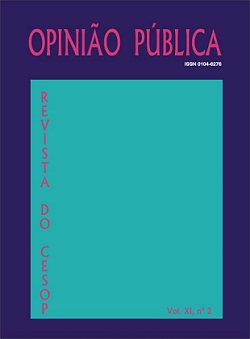Abstract
Este artigo tem o objetivo de analisar se e como os governos municipais das capitais brasileiras estão empregando as novas tecnologias da comunicação e informação (TICs), especificamente a internet, para melhorar a participação do cidadão nos assuntos públicos. O estudo foi baseado no emprego político das TICs segundo cinco graus de participação democrática. Foram analisados os vinte e quatro portais (sítios na rede mundial de computadores) das capitais brasileiras presentes na rede mundial de computadores.
Abstract
The present article has the goal of analyzing if and how governments of Brazilian major towns are employing the TCI’s, in order to improve the levels of civil engagement in the public issues. The study was based on the existence of five degrees of democratic engagement, in the political appropriations of TCI’s. We have analyzed 24 sites located in the internet.
Key words: political communication, digital democracy, internet, local government.
References
BRASIL. Lei complementar nº 101, de 4 de maio de 2000. Estabelece normas de finanças públicas voltadas para a responsabilidade na gestão fiscal e dá outras providências. Diário oficial [da] República Federativa do Brasil, Poder Executivo, Brasília, DF, 2 de maio de 2000. Seção I, art. 48.
BUCHSTEIN, H. Bytes that bite: the internet and deliberative democracy. Constellations, v. 4, n. 2, p. 248-263, 1997.
COLEMAN, S. Cutting out the middle man: from virtual representation to direct deliberation. In: HAGUE, B.; LOADER, B. D. (org.). Digital democracy: discourse and decision making in the information age. London: Routledge, 1999a.
COLEMAN, S. Can the new media invigorate democracy? The Political Quarterly, v. 70, n. 1, p. 16-22, 1999b.
DAHLBERG, L. Democracy via cyberespace: mapping the rhetorics and practices of three prominent camps. New media & society, v. 3, n. 2, p. 157-177, 2001. DEAN, J. Why the net is not a public sphere. Constellations, v. 10, n. 1, p. 95-112, 2003.
FREY, K. Governança eletrônica: experiências de cidades européias e algumas lições para países em desenvolvimento. In: EISENBERG, J.; CEPIK, M. (org.) Internet e política: teoria e prática da democracia eletrônica. Belo Horizonte: UFMG, 2002.
GANDY, O. H. The real digital divide: citizens versus consumers. In: LIEVROUW, L. A.; LIVINGSTONE, S. (org.). Handbook of new media: social shaping and consequences of ICTs. London: Sage, 2002.
GOMES, W. Transformações da política na era da comunicação de massa. São Paulo: Paulus, 2004a.
GOMES, W. Ciberdemocracia: possibilidades e limites. 2004. Conferência Inaugural do II Congresso Ibérico de Comunicação, Covilhã, Portugal (Inédito), 2004b.
GUTMANN, A.; THOMPSON, D. Democracy and disagreement. Cambridge: Harvard University Press, 1996.
HAGUE, B. N.; LOADER B. D. Digital democracy: an introduction. In: HAGUE, B.; LOADER, B. D. (org.). Digital democracy: discourse and decision making in the information age. London: Routledge, 1999.
LEVY, P. As tecnologias da inteligência: o futuro do pensamento na era da informática. São Paulo: Editora 34, 1995.
LEVY, P. Cibercultura. São Paulo: Editora 34, 1999.
LIEVROUW, L. A.; LIVINGSTONE, S. The social shaping and consequences of ICTs. In: LIEVROUW, L. A.; LIVINGSTONE, S. (org.). Handbook of new media: social shaping and consequences of ICTs. London: Sage, 2002.
MAIA, R. C. M. Redes cívicas e internet: do ambiente informativo denso às condições da deliberação pública. In: EISENBERG, J.; CEPIK, M. (org.). Internet e política: teoria e prática da democracia eletrônica. Belo Horizonte: UFMG, 2002.
MALINA, A. Perspectives on citizen democratization and alienation in the virtual public sphere. In: HAGUE, B.; LOADER, B. D. (org.). Digital democracy: discourse and decision making in the information age. London: Routledge, 1999.
MITCHELL, W. J. City of bits. 1995. Disponível em <http://mitpress2.mit.edu/ebooks/City_of_Bits/>. Acesso em 5 de jun. 2004.
MITCHELL, W. J. E-topia: a vida urbana, mas não como a conhecemos. São Paulo: Senac, 2002.
MOORE, R. K. Democracy and cyberspace. In: HAGUE, B.; LOADER, B. D. (org.). Digital democracy: discourse and decision making in the information age. London: Routledge, 1999.
NEGROPONTE, N. A vida digital. São Paulo: Companhia das Letras, 1995.
PAPACHARISSI, Z. The virtual sphere: the internet as a public sphere. New Media & Society, v. 4, n. 1, p. 9-27, 2002.
RHEINGOLD, H. A comunidade virtual. Lisboa: Gradiva, 1996.
RICHARD, E. Tools of governance. In: HAGUE, B.; LOADER, B. D. (org.). Digital democracy: discourse and decision making in the information age. London: Routledge, 1999.
SCHMIDTKE, O. Berlin in the net: prospects for cyberdemocracy from above and from below. In: TSAGAROUSIANOU, R.; TAMBINI, D.; BRYAN, C. (org.) Cyberdemocracy: technology, cities and civic networks. London: Routledge, 1998.
SPINELLI, M. Democratic rhetoric and emergent media: the marketing of participatory community on radio and the Internet. International Journal of Cultural Studies, v. 3, n. 2, p. 268- 278, 2000.
TOFFLER, A. A terceira onda. São Paulo: Record, 1995.
WEBSTER, F. The information society revisited. In: LIEVROUW, L. A.; LIVINGSTONE, S. (org.). Handbook of new media: social shaping and consequences of ICTs. London: Sage, 2002.
WHILHELM, A. G. Virtual sounding boards: how deliberative is online political discussion. In: HAGUE, B.; LOADER, B. D. (org.). Digital democracy: discourse and decision making in the information age. London: Routledge, 1999.
WOLTON, D. E depois da Internet? Para uma teoria crítica dos novos mídias. Algés: Difel, 2001.
A Opinião Pública utiliza a licença do Creative Commons (CC), preservando assim, a integridade dos artigos em ambiente de acesso aberto.

